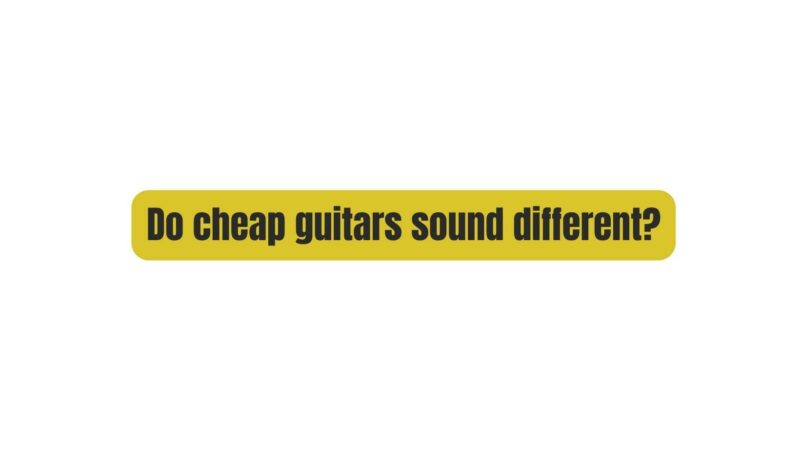The world of guitars is vast and diverse, with instruments available at a wide range of price points. One common question that aspiring guitarists and enthusiasts often ask is whether cheap guitars sound different from their more expensive counterparts. The pursuit of great tone is a fundamental aspect of playing the guitar, and understanding the factors that influence sound quality is essential. In this article, we’ll delve into the tonal characteristics of cheap guitars, explore the factors that affect their sound, and help you gain a better understanding of what to expect when considering a budget instrument.
I. The Influence of Materials and Construction
The materials used in a guitar’s construction play a significant role in shaping its sound. Cheap guitars typically use less expensive materials compared to higher-end models. Here’s how material and construction affect sound:
- Tonewoods: Higher-end guitars often use premium tonewoods for the top, back, and sides. These tonewoods, such as Sitka spruce, mahogany, and rosewood, contribute to a guitar’s tonal characteristics. Cheaper guitars may use laminate woods, which can result in a different sound.
- Build Quality: The craftsmanship and attention to detail during construction are crucial. A well-made guitar, regardless of its price, is more likely to produce clear, balanced tones.
- Bracing Patterns: The internal bracing of a guitar affects its resonance and projection. Different bracing patterns can lead to variations in sound.
II. The Impact of Hardware and Electronics
Hardware components and electronic elements, if applicable, also influence a guitar’s sound. Here’s how they can affect tonal quality:
- Pickups: Electric guitars, in particular, rely heavily on the type and quality of pickups. Cheaper electric guitars may come with lower-quality pickups that can produce different tones compared to high-end pickups.
- Bridge and Saddle: The bridge and saddle materials and design influence the guitar’s sustain, intonation, and resonance.
- Tuners: The quality and stability of tuners can affect a guitar’s ability to stay in tune, which, in turn, can impact its overall sound.
- Electronics: If the guitar has built-in electronics, the quality of the preamp, pickups, and controls can significantly impact the amplified tone.
III. The Role of Setup and Maintenance
A well-set-up guitar can sound significantly better than one that hasn’t been properly adjusted. Setup and maintenance play a crucial role in achieving the desired sound. Here’s how:
- Action: The height of the strings above the fretboard, known as action, affects playability and sound. Proper setup ensures the action is adjusted to produce clear notes without excessive buzzing.
- Intonation: Intonation adjustments ensure that the guitar plays in tune across the entire fretboard.
- String Choice: The choice of strings can have a noticeable impact on a guitar’s tone. Different strings offer different tonal characteristics.
IV. Cheap Guitars and Their Unique Sound Profiles
While it’s true that cheap guitars may sound different from their higher-end counterparts, it’s essential to recognize that “different” doesn’t necessarily mean “worse.” Cheap guitars often have unique sound profiles that can be appealing in their own right:
- Bright vs. Warm: Some cheap guitars may lean towards brighter tones, while others might produce warmer, mellower sounds. The tonal preference is subjective and can vary from player to player.
- Character and Identity: Cheap guitars often have their unique character and identity. They can produce tones that stand out in certain musical contexts.
- Affordability and Accessibility: Budget guitars make it possible for more people to start playing and exploring music, and the distinct tones they produce can inspire creativity.
V. Playing Style and Genre Considerations
The choice between a cheap and expensive guitar may also depend on your playing style and the musical genres you’re interested in:
- Genre Compatibility: Certain musical genres may benefit from the tonal characteristics of cheap guitars. For example, a bright-toned guitar might be well-suited for country music, while a warmer sound might be preferred for blues.
- Personal Preference: Your personal playing style and preferences will also influence the type of guitar that suits you best. Some players might appreciate the unique qualities of cheap guitars.
VI. Tips for Choosing a Cheap Guitar with the Right Sound
If you’re considering a cheap guitar and want to ensure it produces the sound you desire, consider the following tips:
- Test It Out: Visit a music store and try out different cheap guitars to find one that matches your tonal preferences and feels comfortable to play.
- Ask for Professional Setup: Invest in a professional setup for your guitar. A well-set-up cheap guitar can often sound better than a poorly set-up expensive one.
- Explore Different String Brands and Gauges: Experiment with different string brands and gauges to find the ones that enhance the desired tonal characteristics.
VII. Conclusion: Finding Your Sound
In conclusion, cheap guitars can indeed sound different from their more expensive counterparts, but different doesn’t necessarily mean inferior. The tonal characteristics of a guitar are influenced by various factors, including materials, construction, hardware, and setup. While cheap guitars may have unique sound profiles, they offer affordable entry points into the world of music, allowing more people to explore their passion for playing.
Ultimately, the right guitar for you is the one that resonates with your musical aspirations and preferences. Embrace the uniqueness of cheap guitars, experiment with different instruments, and let your passion for music be your guide as you embark on your journey of sonic exploration. Remember that sound is a highly subjective and personal aspect of music, and the most important thing is to enjoy the music you create, regardless of the guitar’s price tag.


